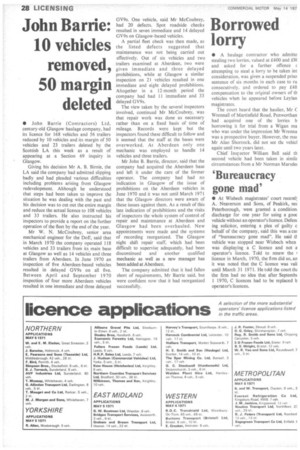John Barrie: 10 vehicles removed, 50 margin deleted
Page 30

If you've noticed an error in this article please click here to report it so we can fix it.
• John Barrie (Contractors) Ltd, century-old Glasgow haulage company, had its licence for 168 vehicles and 56 trailers reduced by 10 vehicles and its margin of 50 vehicles and 23 trailers deleted by the Scottish LA this week as a result of appearing at a Section 69 inquiry in Glasgow.
Giving his decision Mr A. B. Birnie, the LA said the company had admitted slipping badly and had pleaded various difficulties including problems arising from Glasgow redevelopment. Although he understood that steps had been taken to improve the situation he was dealing with the past and his decision was to cut out the entire margin and reduce the actual licence to 108 vehicles and 33 trailers. He also instructed his inspectors to provide a report on the further operation of the fleet by the end of the year,
Mr W. N. McCoubrey, senior area mechanical engineer for the DoE, said that in March 1970 the company operated 118 vehicles and 33 trailers from its main base at Glasgow as well as 14 vehicles and three trailers from Aberdeen. In June 1970 an inspection of five Aberdeen-based vehicles resulted in delayed GV9s on all five. Between April and September 1970 inspection of four more Aberdeen vehicles resulted in one immediate and three delayed
GV9s. One vehicle, said Mr McCoubrey, had 20 defects. Spot roadside checks resulted in seven immediate and 14 delayed GV9s on Glasgow-based vehicles.
A partial fleet check was then made, as the listed defects suggested that maintenance was not being carried out effectively. Out of six vehicles and two trailers examined at Aberdeen, two were given immediate and three delayed prohibitions, while at Glasgow a similar inspection on 21 vehicles resulted in one immediate and eight delayed prohibitions. Altogether in a 12-month period the company had had 11 immediate and 33 delayed GV9s.
The view taken by the several inspectors involved, continued Mr McCoubrey, was that repair work was done as necessary rather than on a fixed basis of time of mileage. Records were kept but the inspectors found these difficult to follow and it seemed that the staff at the bases were overworked. At Aberdeen only one mechanic was employed to handle 14 vehicles and three trailers.
Mr John B. Barrie, director, said that the company had acquired the Aberdeen base and left it under the care of the former operator. The company had had no indication in Glasgow of the issue of prohibitions on the Aberdeen vehicles in June 1970 and it was not until March 1971 that the Glasgow directors were aware of these issues against them. As a result of this late indication of prohibitions and the visits of inspectors the whole system of control of repair and maintenance at Aberdeen and Glasgow had been overhauled. New appointments were made and the systems of recording reorganized. The Glasgow night shift repair staff, which had been difficult to supervise adequately, had been discontinued and another qualified mechanic as well as a new manager has been added at Aberdeen.
The company admitted that it had fallen short of requirements, Mr Barrie said, but were confident now that it had reorganized successfully.




































































































